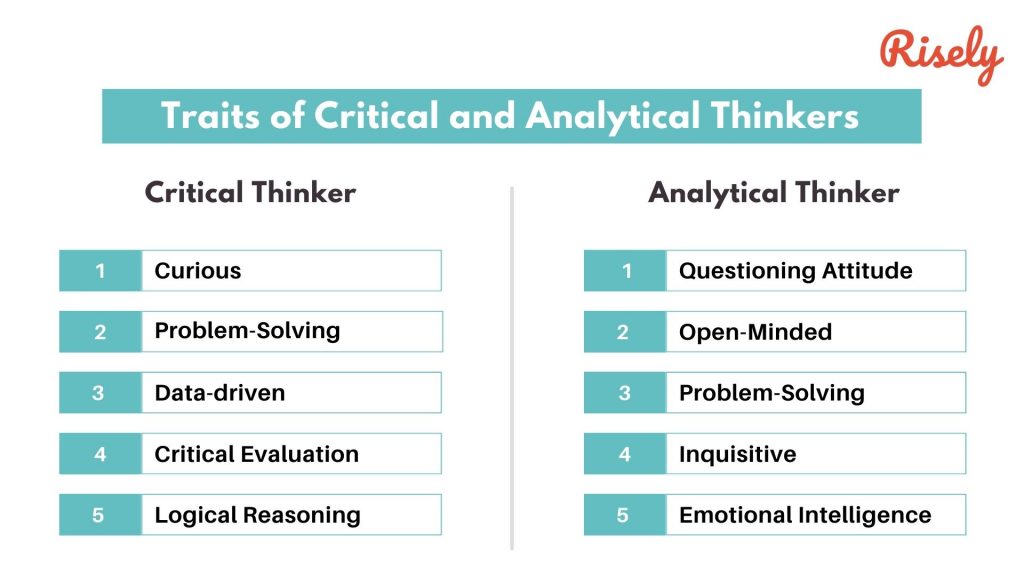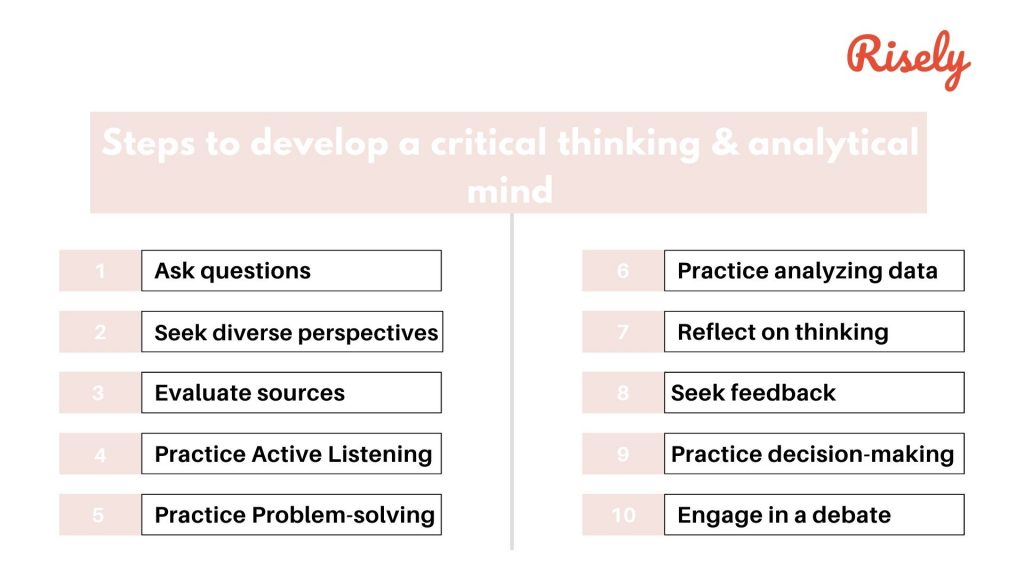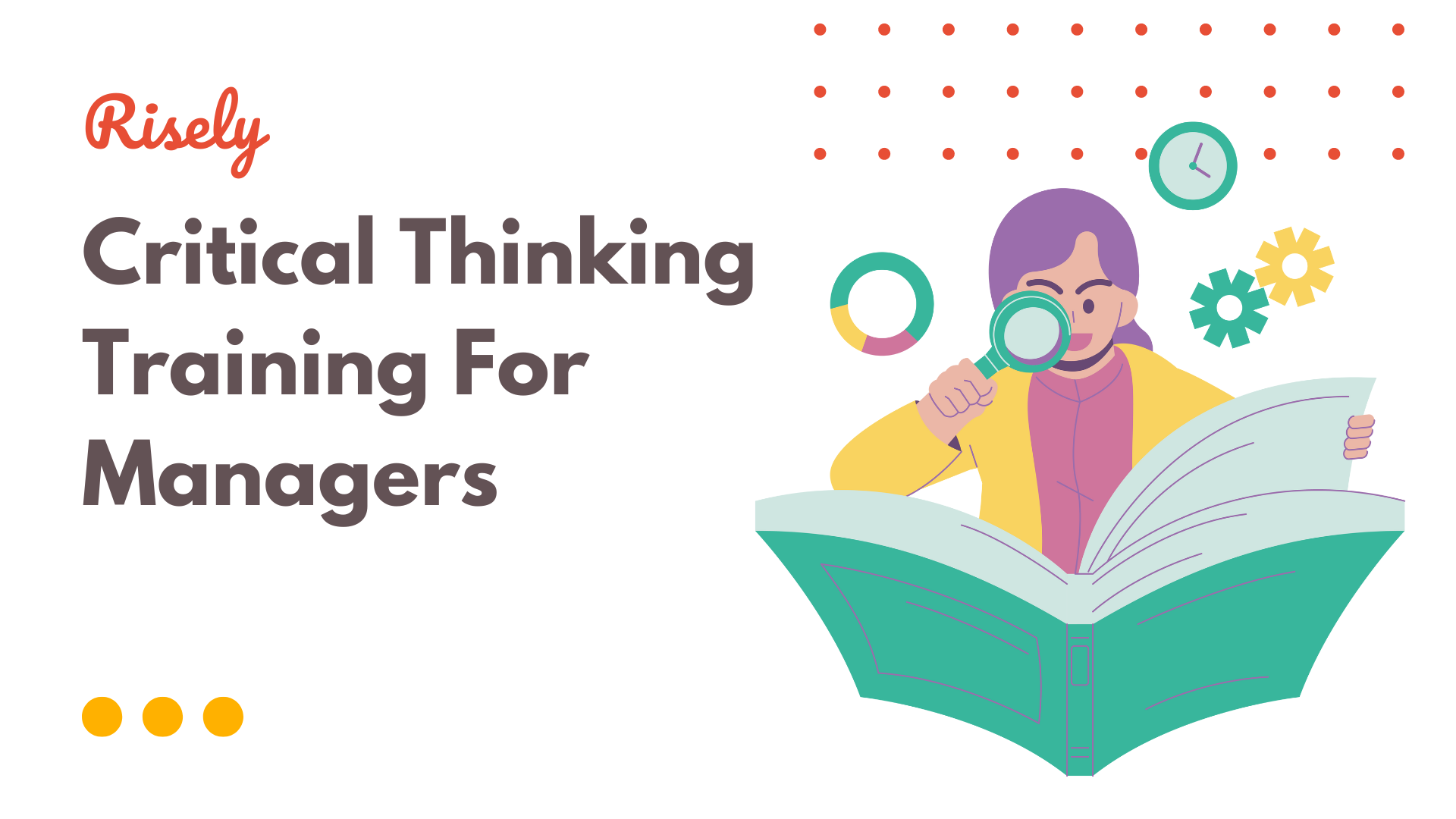Critical Thinking vs Analytical Thinking: What’s the Difference?
Decision-making is one of the most crucial parts of our daily lives. We make multiple decisions throughout the day for both our personal and professional lives. Two types of thinking help us to make informed and responsible decisions: Critical and Analytical Thinking. Often, these are used interchangeably but are two distinct types of thinking. Critical thinking involves evaluating information and making judgments based on evidence, while analytical thinking involves breaking down complex information into its parts to understand its underlying structure. his blog will explore these differences in detail and discuss why they are essential for personal and professional growth.- Critical Thinking vs Analytical Thinking: What’s the Difference?
- What is critical thinking?
- What is analytical thinking?
- Traits of Critical Thinkers
- Traits of Analytical Thinkers
- Critical Thinking vs Analytical Thinking for Managers
- Why are critical thinking and analytical skills important?
- How to develop a critical thinking and analytical mind?
- Conclusion
- Critical Thinking vs Analytical Thinking FAQs
- Other Related Blogs
What is Critical Thinking?
Critical thinking is an objective process of examining and evaluating an issue to form a judgment. It involves questioning, analyzing, and evaluating the facts and figures presented to make judgments based on these and other inputs. Critical thinking requires reasoning and being an active learner rather than a passive recipient of information. Critical thinkers identify, analyze and solve problems systematically rather than by intuition or instinct. It is a crucial process that helps individuals develop a deeper understanding of an issue or situation and make more informed decisions. Read more here: How To Train Your Brain For Critical Thinking As A ManagerWhat is Analytical Thinking?
Analytical thinking breaks down complex issues or concepts into smaller, more digestible pieces. It is a logical process to solve problems in various aspects of life, including science, technology, society, business, and management. Unlike critical thinking, analytical thinking involves focusing on oneself to analyze an issue rather than looking outside of oneself to assess a problem. The core activities of analytical thinking include concentrating on facts and evidence, analyzing data or information, dissecting data/information, reasoning, partitioning and breakdown, eliminating extraneous data, and analyzing trends. With analytical thinking, individuals can approach complex problems logically and well-informedly.Traits of Critical Thinkers
- Curious: They possess a natural curiosity and an insatiable desire to learn and understand. They constantly ask questions and seek deeper knowledge.
- Structured Problem-Solving: Analytical thinkers approach problems systematically. They break down complex issues into smaller, manageable components for thorough analysis.
- Data-driven: They rely on data and evidence to support their conclusions. Data analysis is a key aspect of their decision-making process.
- Critical Evaluation: They critically assess the quality and reliability of information sources. They are discerning about the credibility of data.
- Logical Reasoning: They employ logical reasoning to connect facts and deduce insights. Their arguments are based on sound logic.

Traits of Analytical Thinkers
- Questioning Attitude: Critical thinkers question assumptions, statements, and conventional wisdom. They challenge ideas to seek deeper understanding.
- Open-Minded: They maintain an open mind, considering multiple perspectives and being receptive to new information.
- Problem-Solving: Critical thinkers approach problems by examining all angles, evaluating evidence, and identifying the best possible solutions.
- Inquisitive: They have a natural curiosity and an appetite for knowledge. They are motivated to dig deeper into subjects.
- Emotional Intelligence: They are attuned to emotions, both their own and those of others. This awareness helps them understand human behavior and reactions.
Critical Thinking vs Analytical Thinking for Managers
Critical thinking and analytical thinking are two crucial cognitive skills often used interchangeably, but there are subtle differences between the two. Analytical thinking involves breaking down complex information into smaller, more manageable parts to understand how they relate. This type of thinking is often used in scientific research, where researchers break down a problem into its parts and analyze each part separately to gain a deeper understanding of the problem as a whole.For example
- A retail store manager might use analytical thinking skills to analyze sales data to identify patterns and trends. For example, they might examine sales data to determine which products are selling well and at what times of day or year. They might then use this information to adjust inventory levels, schedule staff, or develop marketing campaigns to capitalize on trends.
- A manager might use analytical thinking skills to analyze financial data to identify cost savings or revenue growth opportunities. For example, they might analyze expense data to identify areas where costs are higher than expected and develop strategies to reduce them. They might also analyze sales data to identify opportunities to expand into new markets or increase revenue from existing customers.
For example
- A manager might use critical thinking skills to evaluate competing proposals for a new project. For example, they might consider each proposal based on feasibility, cost, the potential impact on the organization, and alignment with its strategic goals. They might then use this evaluation to make an informed decision about which proposal to pursue.
- A manager might use critical thinking skills to evaluate the performance of individual employees or teams. For example, they might evaluate employee performance based on factors such as productivity, quality of work, and adherence to company policies and procedures. They might then use this evaluation to decide on promotions, training, development, or disciplinary action.
Other Interesting Reads
Why are Critical Thinking and Analytical Skills Important?
Critical thinking and analytical skills are essential for many reasons, including:- Effective problem-solving: Critical thinking and analytical skills are essential for identifying, analyzing, and solving complex problems. By breaking down problems into smaller parts and evaluating each part objectively, individuals can develop effective solutions to complex problems.
- Improved decision-making: Critical thinking and analytical skills help individuals make well-informed decisions by evaluating and synthesizing information from multiple sources. By objectively assessing information, individuals can make decisions based on evidence rather than biases or emotions.
- Increased creativity: Analytical thinking skills can help individuals identify patterns and connections between seemingly unrelated pieces of information, leading to creative problem-solving and innovative solutions.
- Better communication: Critical thinking skills help individuals evaluate the quality of arguments and evidence presented by others, leading to more transparent and effective communication.
- Success in the workplace: Employers value critical thinking and analytical skills because they enable individuals to be more effective problem-solvers and decision-makers, leading to better business outcomes and increased success.

How to Develop a Critical Thinking and Analytical Mind?
Acquiring critical thinking and analytical thinking skills requires consistent practice and exploration. Here are 10 ways to develop critical thinking and analytical skills:- Ask questions: Ask questions to clarify information, evaluate evidence, and challenge assumptions. This helps you better understand the information and think more critically about it.
- Seek out diverse perspectives: Engage with people who have different backgrounds and experiences from your own. This helps you to see problems from different angles and gain new insights.
- Evaluate sources: Practice evaluating the credibility of sources, such as news articles or research studies. This helps you develop a critical eye and avoid being swayed by false information.
- Practice active listening: When engaging in conversation, try to listen to others and truly understand their perspectives. This helps you to evaluate information objectively and avoid making assumptions.
- Practice problem-solving: Regularly engage in problem-solving activities like puzzles or brain teasers. This helps you to develop your analytical skills and practice thinking creatively.
- Practice analyzing data: Analyze data from different sources and identify patterns or trends. This helps you to develop your analytical skills and practice thinking critically about information.
- Reflect on your thinking: Regularly reflect on your thinking processes and evaluate how you approach problems or make decisions. This helps you identify improvement areas and develop better critical thinking habits.
- Seek feedback: Ask for feedback from others on your critical thinking and analytical skills. This helps you to identify areas where you can improve and develop new strategies for thinking more critically.
- Practice decision-making: Practice decision making based on evidence and logical reasoning rather than emotions or biases. This helps you to develop more effective decision-making skills.
- Engage in a debate: Participate in debates or discussions where you are challenged to defend your position and evaluate opposing arguments. This helps you to practice critical thinking and develop more effective communication skills.
Conclusion
In conclusion, analytical thinking and critical thinking are essential problem-solving skills in business, leadership, decision-making, and growth. They are of most importance as Managers can make or break company growth. While analytical thinking is about breaking down complex information into parts and analyzing each part in detail, critical thinking is about evaluating information to make informed decisions or judgments. Developing effective critical thinking and analytical skills is a lifelong process that involves continuous learning, self-reflection, and an open-minded approach. By cultivating these skills, you can enhance your decision-making abilities and improve your overall problem-solving capabilities. To learn more about developing these skills, check out our blog on practical solutions to develop your critical thinking and analytical skills.Test your critical thinking skills for free!
Start the free critical thinking skills assessment for managers .
Critical Thinking vs Analytical Thinking FAQs
Is analyzing a critical thinking skill?
Yes, analyzing is a critical thinking skill. It involves breaking down information or data into smaller parts or components to understand it better. Analyzing can also help you identify patterns, connections, and relationships between different pieces of information. This skill is essential for problem-solving, decision making, and evaluating the quality and reliability of the information.
Can you be both an analytical and critical thinker?
Yes, it is possible to be both an analytical and critical thinker. These skills often complement each other well. Analytical thinking involves breaking down complex problems into smaller parts to understand them better, while critical thinking involves evaluating information objectively and making informed decisions. Combining these two approaches allows you to develop a more well-rounded and effective problem-solving process.
How can I be critical and analytical?
To be critical and analytical, approach information objectively rather than accept it at face value. Look for evidence to support claims and consider multiple perspectives on an issue. Question assumptions and biases and ask yourself whether the information presented makes sense. Take the time to analyze, evaluate, and draw conclusions based on the available evidence. Practice critical thinking regularly, and seek out alternative viewpoints to broaden your understanding of a topic.
Other Related Blogs
Critical Thinking Training For Managers Simplified
Critical Thinking Training For Managers Simplified Critical thinking is an essential skill that you must possess to effectively lead teams and make informed decisions. It involves collecting and analyzing information…
6 Steps to Beat Common Critical Thinking Barriers at Work
6 Steps to Beat Common Critical Thinking Barriers at Work Critical thinking is a valuable life skill that allows us to analyze and evaluate information before making decisions. However, it…
How to develop the 8 Conceptual Skills every Manager needs?
How to Develop the 8 Conceptual Skills Every Manager Needs? It’s no secret that success in any professional field hinges on thinking critically, strategically, and creatively. That’s where conceptual skills…
7 Ways to Develop Critical Thinking Skills as a Manager
7 Ways to Develop Critical Thinking Skills as a Manager Critical thinking is the ability to think logically and analytically and make sound decisions. It is the ability to think…


